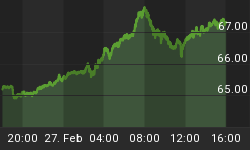Why Read: Because it is foolish not to consider the possibility of depression, particularly in the face of the preponderance of commentary over the past many months that rampant inflation is on the horizon
Featured Article: An article published yesterday:
-
carries a headline that says: "Is this 1931 all over again? Paul Krugman, Noriel Roubini, Niall Ferguson and more think so";
-
reports a number of economists, some of them particularly well known (and who the article infers "normally find little common ground"), are now considering whether we are about to see a repeat of the "economic catastrophe of 1931" - citing Niall Fergusson, Paul Krugman and Nouriel Roubini among others;
-
reports Bradford DeLong and Barry Eichengreen, both economics professors at the University of California - Berkeley, said in a recent book preface "The parallels between Europe in the 1930s and Europe today are stark, striking, and increasingly frightening"; and,
-
cites unemployment, youth unemployment, and financial instability and distress as 'widespread' as some of the reasons economists and others may be expressing the view that depression may be possible.
This article has links to two things you ought to read:
-
George Soros warns euro at risk if this week's summit fails, The Financial Post, from Bloomberg News, Jesse Westbrook, June 25, 2012 - reading time 3 minutes; and,
-
Berlin Is Ignoring the Lessons of the 1930's (Niall Ferguson and Noriel Roubini), June 8, 2012 - reading time 4 minutes.
Commentary: First, the article attributes views to the referenced economists that may be read in the article as expressions of stronger views by those economists than currently is the case. That said:
-
Niall Ferguson and Nouriel Roubini are of a mind that the specter of early 1930's world economic conditions is not as surprising as to have it reported that Paul Krugman may in certain circumstances be in such a mind-space; and,
-
Mr. Krugman, a Nobel Prize winner, believes (or so it seems from his writings) that most country economic issues can be solved by Central Banks printing more money. In this regard see the second article referenced in this commentary. Mr. Krugman's position, expanded from what one might simplistically take from the article headline, as set out in the second referenced article, is:
"The fundamentals of the world economy aren't, in themselves, all that scary; it's the almost universal abdication of responsibility that fills me, and many other economists, with a growing sense of dread.";
Observations:
-
the economic conditions cited in the article are nothing new, and should be well known to anyone who wakes up in the morning and has even minimal economic curiosity;
-
there is little question that each day it seems one or more incremental pieces of poor economic news are reported from somewhere in the ever more globalized world;
-
there is also little question that people who have an interest in what is going on in the world economically generally are more concerned with possible consequences than they were even three months ago;
-
there is also little question that more and more people are waking up to believe that it is important they take an interest in what is going on economically in the Eurozone in particular, but in the world economy generally;
-
could we be re-visited by an early 1930's scenario, of course we could;
-
importantly, each country has his own unique financial 'cliff', although in a globalized financial markets and economies world, depending on outcomes contagion factors may come into play in an important way among countries;
-
will we be re-visited by an early 1930's scenario - quite possibly, but not certainly, and only after those governing:
-
finally reach 'the countries own financial cliff',
-
have by then failed to introduce programs that result in real and meaningful economic growth, and
-
have nowhere to go but over that cliff;
-
-
how far from here is their edge of their respective cliffs for each country that is now in financial difficulty? That is the $64 (now no longer $64) question. Depending on the country, they could be years away or months away. It is unlikely any are as yet days away;
-
how far away the edge of their cliff each such country is has to be in part dependent upon the evolving functionality of each country's government where, particularly in the United States, many of those governments currently are deadlocked or simply 'stalled'; and,
-
don't hold your breath and be very worried as each country in financial difficulty works to 'herd its cats in its own barn', and globally, all governments work to 'herd all the cats in the barnyard'.
Is this 1931 all over again? Paul Krugman, Noriel Roubini, Niall Ferguson and more think so
Source: The Financial Post, Pamela Heaven, June 25, 2012
Reading time: 4 minutes, thinking time much longer
Also read: Krugman: Central banks aren't doing enough
Source: The Salt Lake Tribute, Paul Krugman, June 26, 2012
Reading time: 3 minutes















